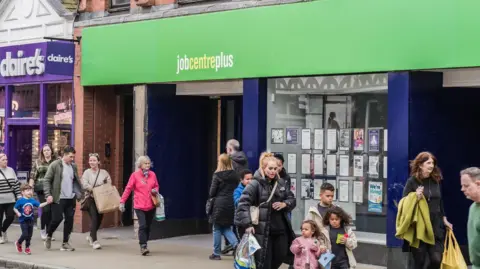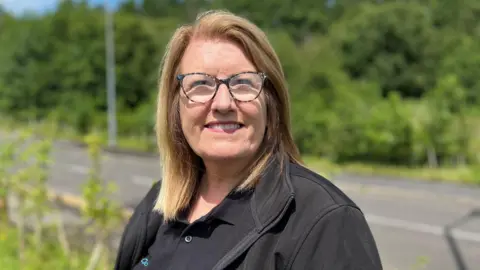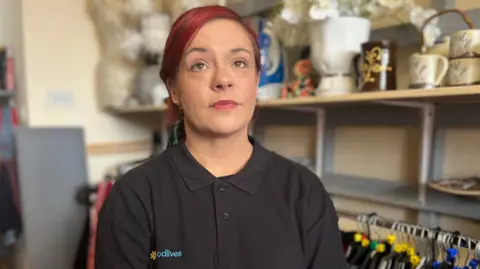Plans to help benefits recipients into work 'a mess', say DWP officials
 Getty Images
Getty ImagesGovernment plans to speed up employment support for people affected by the changes to welfare benefits will be "undeliverable", the BBC has been told.
As part of the U-turn on welfare reforms, ministers are expected to fast-track a £1bn support plan to get people into work, which was originally scheduled for 2029.
But officials at the Department for Work and Pensions (DWP) said the system was "a mess" and that there were "only a handful of people" working on the programme.
The DWP did not address the claims made by the officials but said it had taken "decisive action" and was "committed to driving up employment and opportunity across the country".
A key aim of the government is to get more people into work in part to reduce the welfare bill and to achieve its aim of growing the economy in order to boost living standards.
Ministers have argued that intensive job support will help those unemployed and has set aside £1bn to help those in need.
But a senior benefits official told the BBC the government did not have a "properly considered or deliverable programme".
"There hasn't been enough pace or passion to get the thing set up," they said.
The government initially hoped to save £5bn a year by 2030 through its welfare reforms, while slowing the increase in people claiming benefits. Working-age health-related benefits are estimated to cost an extra £30bn by 2029 without any changes.
But the government faced a growing rebellion from around 120 Labour MPs over the proposed changes, so decided to amend its plans.
The climbdown means existing recipients of both the main disability benefit, personal independence payment (Pip), and the health element of universal credit will continue to receive what they currently get.
Instead, planned cuts will only hit future claimants.
The U-turn means that a £5bn saving is likely to be around £2.5bn to £3bn now, which has added to further speculation of tax rises in the Autumn Budget, given Chancellor Rachel Reeves had factored in these cuts to help meet her self-imposed financial rules.
One DWP official told the BBC "there hasn't been much done" since the government announced its employment support scheme back in March, adding that not enough job coaches were being recruited.
Contracted employment support - where outside companies are hired to help deliver the programme – is also said to be behind schedule, with cheaper, lower-profile employment schemes understood to have much bigger teams working on them.
'Difficult people to get into work'
Estimates within the DWP for the number of people who will get a job are said to be "very low".
"They are notoriously difficult people to get into work because in many cases they've been out of the job market for a while and employers are not willing to take a chance on them," said a senior official.
Rural parts of Cumbria starkly highlight the challenges the government faces. In the Cumberland Council jurisdiction, which covers the north and west parts of the county, 51% of people on universal credit have no requirement to look for work, mainly due to health reasons.
While physical health conditions, such as arthritis and musculoskeletal conditions are prevalent, in recent years large increases in mental health conditions, such as bipolar disorder, anxiety and depression, have driven the increase.
Colin Cox, director of public health at Cumberland Council, pointed out that many of these conditions are very real – the suicide rate is much higher than the average for England, for instance.
But he also argued some "common experiences" had been over-medicalised.
"The solutions you bring forward for that are very different [than just] prescribing an anti-depressant," he added.
A government statement said its "once-in-a-generation package of employment support" would "guarantee that disabled people and those with health conditions on out-of-work benefits will be able to access tailored work, health, and skills support, through new and existing programmes".

But even with tailored support, finding a job in some areas can be challenging. The BBC examined the government's own job search website for work in three coastal towns in Cumbria - Maryport, Whitehaven and Workington.
Dozens of jobs were available but more than half of them were in the care sector, restricting what people can do. Poor public transport is also a limiting factor for people living in rural areas.
Karen Jones, who runs the GoodLives charity in Cleator Moor which helps about 200 people a year, said "confidence is a very big thing" when people were looking for work.
"Getting them into employment can be difficult and once they've got a job, we maintain contact for up to six months.
"If you've never worked before, it's a very vulnerable time when you get your first job and it can be the difference between success and failure."

Kerry Ritson was supported by GoodLives and works eight hours a week in the charity's shop.
She has ADHD and two children with behavioural challenges and spent years frightened to engage with the outside world.
She said if she had not taken the chance of the job, "I wouldn't be feeling confident in myself, I wouldn't have made friends for life".
"I looked as though I was doing ok, but I mask and I just wasn't me. I'm starting to learn how to be me," she added.
